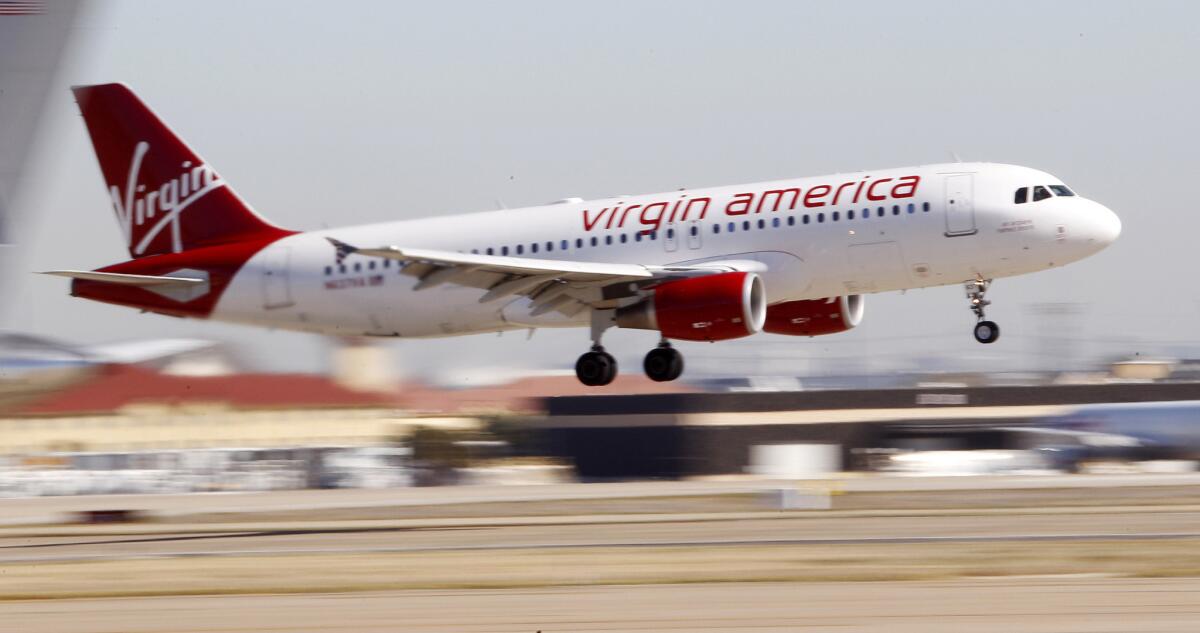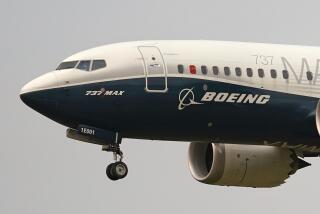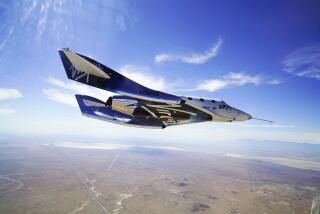Alaska Air to buy Virgin America, stripping California of its only major airline

A Virgin America plane lands at Dallas Fort Worth International Airport in December 2010.
Alaska Air Group Inc.’s $2.6-billion purchase of Virgin America would unite no-frills Alaska Airlines, which boasts a solid financial history, with a California airline that oozes style and technology but has struggled to make a profit.
The deal announced Monday was seen as a defensive move to prevent rival bidder JetBlue Airways Corp. from getting its hands on Virgin America, which is partly owned by celebrity entrepreneur Richard Branson.
The takeover would allow Seattle-based Alaska Airlines to expand its dominance in the Pacific Northwest to California, where Virgin America now serves Silicon Valley business leaders and Hollywood elites flying between the Bay Area and Los Angeles.
“This gives us a solid foothold in California,” Brad Tilden, chairman and chief executive of Alaska Air Group, said in a conference call with investors Monday.
The proposed transaction would expand Alaska’s popular loyalty reward program — one of the few in the industry that still allots points based on miles traveled — to Virgin America fliers.
“That’s actually good news from a frequent flier perspective,” said Brian Karimzad, founder of Milecards.com, a website that compares reward programs.
Consumers will otherwise notice little difference, according to industry experts, given that Alaska and Virgin America have few overlapping routes. Fares have held steady for months because of lower fuel prices, and competition should squelch any urge to boost ticket prices after the carriers combine, analysts said.
The deal must be approved by Virgin America shareholders and federal regulators, and it is projected to close by the end of the year. Under the agreement, Alaska Air Group would acquire Virgin America for $57 a share in cash. Including Virgin America’s existing debt, as well as capitalized aircraft operating leases, the transaction value is about $4 billion, the two airlines said.
The deal is expected to generate $225 million a year in “net synergies” after spending as much as $350 million to integrate the two companies, Alaska Air Group said.
“The bottom line is that we view this transaction as being very positive for Virgin America and a positive one for Alaska,” Deutsche Bank said in a memo to its clients Monday.
The purchase would expand Alaska on the East Coast by adding Virgin America’s routes to slot-controlled airports including Ronald Reagan Washington National Airport and New York’s John F. Kennedy International Airport and LaGuardia Airport.
The merged carrier would be based in Seattle and headed by Tilden. Virgin America Chief Executive David Cush would partner with Tilden on a transition team to integrate the two airlines.
Alaska officials remained vague on whether they would keep the Virgin America brand or simply absorb all of the planes and assets under the Alaska banner.
Similarly, they had nothing to say about layoffs at Virgin America’s headquarters in Burlingame, Calif. Alaska Airlines currently employs 15,200 people to Virgin America’s 3,000, the companies said.
In a letter to Virgin America employees, Branson expressed sadness over the deal, saying he had plans to continue to expand the carrier. But as a foreign-based, minority-share owner “there was sadly nothing I could do to stop it,” he said.
Join the conversation on Facebook >>
The two airlines combined would operate a fleet of 282 jets carrying 39 million passengers and flying to 114 destinations. The consolidated airline — along with Alaska’s regional carrier, Horizon Air — would surpass JetBlue as the nation’s fifth-largest carrier, based on passenger data from the two carriers.
At Los Angeles International Airport, Alaska is the fifth-largest carrier, with Virgin America ranked as sixth. The two carriers would combine to nearly close the gap but not surpass the fourth-largest carrier, Southwest Airlines, according to the latest data. In San Francisco, Alaska would move to second place from sixth.
The deal is the latest in a series of mergers and takeovers that date back more than a decade and have put control of more than 70% of the nation’s domestic air traffic in the hands of four airlines: Delta, American, United and Southwest. As a result of the past combinations and a steep drop in fuel costs, most of the nation’s airlines have been reporting record profits in the last year or two.
Although the recent merger between American Airlines and US Airways was initially opposed by the U.S. Department of Justice, antitrust experts say the takeover of Virgin America by Alaska probably will be seen by federal regulators as a union that helps Alaska better compete against larger rivals.
“The DOJ has a soft spot for the little guys who are challenging the incumbents,” said Mike Keeley, an antitrust attorney for the firm Axinn, Veltrop & Harkrider.
On paper, the combining of Virgin America and JetBlue made more sense because Virgin America’s routes on the West Coast would have helped supplement JetBlue’s strength in the New York area. Also, Virgin America and JetBlue fly fleets primarily of Airbus jets.
But experts said Alaska was forced to make a bid to buy Virgin America primarily to keep JetBlue from acquiring the airline to expand into the West Coast and threaten Alaska’s future growth plans.
“Alaska would have been worse off had JetBlue gotten Virgin America,” said Seth Kaplan, managing partner for the trade publication Airline Weekly.
Branson said he helped launch Virgin America in 2007 to create an affordable carrier with superior service. It was the first airline to offer onboard wireless Internet throughout the fleet, mood lighting and a touch-screen entertainment system that can also be used to order food and drinks. But the airline lost money each year until 2013.
Virgin America went public in 2014, raising $305 million from the initial public stock offering. At the time, the company said it intended to use the cash to push for more market share and new routes.
Virgin America’s stock jumped $16.21 a share, or 42%, to $51.11 on Monday. The $57-a-share Alaska offer represented a 47% premium over Friday’s closing price.
Alaska Air Group’s stock fell $3.09 a share, or 4%, to $78.92. JetBlue shares fell 92 cents, or 4%, to $20.41
Twitter: @hugomartin
ALSO
Here’s what you should know when shopping for airfares this spring
Southwest to launch new service from Long Beach to Oakland
Airlines scrap bereavement fares even as they make record profits
More to Read
Inside the business of entertainment
The Wide Shot brings you news, analysis and insights on everything from streaming wars to production — and what it all means for the future.
You may occasionally receive promotional content from the Los Angeles Times.











